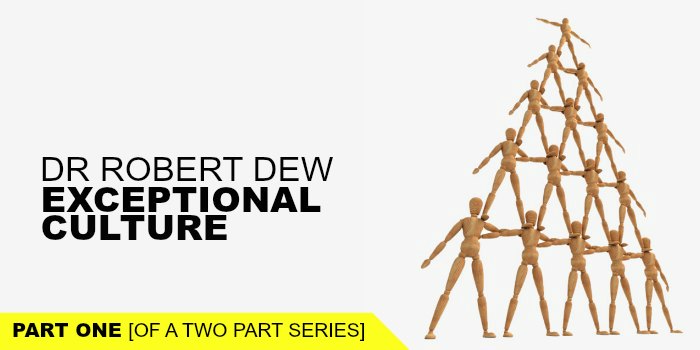
This paper By Dr Robert Dew covers; Why managing culture matters and What is an effective organisational culture. Part Two will be released next month and will continue to discuss; How to assess and change culture, and Where to start in your organisation.
Exceptional culture is rare
This century Australia has had eleven Royal Commissions starting with HIH Insurance in 2001 and continuing to with Aged Care Quality and Safety. Whether involving players from the public or private sectors, the prevalent problem posed in all of these inquiries includes failures of organisational culture. Managing culture is important. This paper is about helping understand what organisational culture is, what it does and how to change it. We have seen first hand how positive cultural values can create an advantage for organisations and we are on a mission to help the good guys win.
This article came about because of recent work we have done for clients in the ‘for-purpose’ sector. Our clients were routinely crashing into a cultural barrier where compliance focus seemed to be preventing customer-centricity. Changes to the funding regimes for these clients meant winning customers was now just as important as being compliant, so cultural change was imperative. This article includes some of what we know, about how to help in this area.
Managing culture is often overlooked

Dwight D Eisenhower asserted “plans are useless but planning is indispensable.” We think this idea applies as much to business as to battle. We see clients with clear metrics, detailed procedures, written policies, limits of authority, involved leadership and mature market strategies still struggle with their business reality, especially around Customer Experience [CX] and Innovation. They are often perplexed when attempts to increase control don’t work. The irony is missing the need for more responsiveness, particularly when it comes to care. Some business situations require discretion, initiative or flexibility. For many managers this can feel like a lack of control or non-compliances. This is why organisational culture is significant.
Organisational culture is what guides people to navigate the grey areas and respond to circumstances. Culture supports controlled responsiveness. An effective culture is an exceptional one. In exceptional cultures, people know when to go beyond the rules to get the best outcome. They make distinctions about when, where and how to deal with circumstances beyond the routine. They take a considered approach over autopilot.
Companies with exceptional cultures deliver better business outcomes: they are more productive, enjoy higher staff retention rates, have superior customer referral rates and less legal problems. A good example is the Mater Hospital in Brisbane. Having had two babies, several surgeries and a range of diagnostic and out patient procedures it is apparent the Mater Hospital culture is based on a deep care for patients. Valuing compassion doesn’t replace the very necessary procedures, policies, structures and systems needed to run the hospital. Instead it makes the experience of dealing with the hospital more human. This gives the Mater a remarkable advantage when patients have a choice about where to seek healthcare services. This is not the only aspect of the Mater’s culture, just one of the most visible. Organisational culture is typically multi-faceted…
Values really matter

Every firm is unique, so understanding what makes up organisational culture takes a different level of enquiry. The mundane aspects of culture are the rituals, icons and artefacts that identify an organisation as different. These things provide the tangible evidence of culture and give people something to hang on to and identify with. But these elements are not how culture guides.
It is the values and beliefs people in an organisation share which create the potential to be effectively responsive. Because values and beliefs are less tangible than rituals and icons they can be ignored. Confucius said “when the wise man points to the moon, the idiot looks at his finger.” Trying to appraise a culture can be like this.
When we worked recently for BankWest, one surprising aspect of their culture was the ritual of “stand up showcases”. These meetings were part of the scaled agile methodology the bank had adopted to get traction for change. Showcases shared scrum progress with other bank stakeholders (scrum means team in agile management speak). What was important about the showcases was not the prohibition for people to sit, it was the idea they should be fast, informal, frequent and show progress.
The showcases supported some key values in the bank including taking responsibility for the scrum to remain aligned with the wider bank systems and processes, and the need to be accountable for getting things done.
To create cultural shifts…
In part Two, Dr Robert Dew will discuss; How to assess and change culture, and Where to start in your organisation. [In a future newsletter; April 2019].
Dr Robert Dew helps the good guys win. If you would like to know more about his presentations or training options click here, or call us today for more information 1300 55 64 69.
ABOUT DR ROBERT DEW | web profile
Dr Robert Dew is a world class presenter who truly knows how to excite his audience. He is regularly described as ‘thought provoking’, ‘entertaining’, and ‘intensely motivational’. As an innovation management consultant he has worked for some of Asia and Australia’s largest companies (both public and private), as well as starting his own new ventures. Read more.
Are you looking to create an amazing impact at your next conference? Contact the team at Great Expectation.


